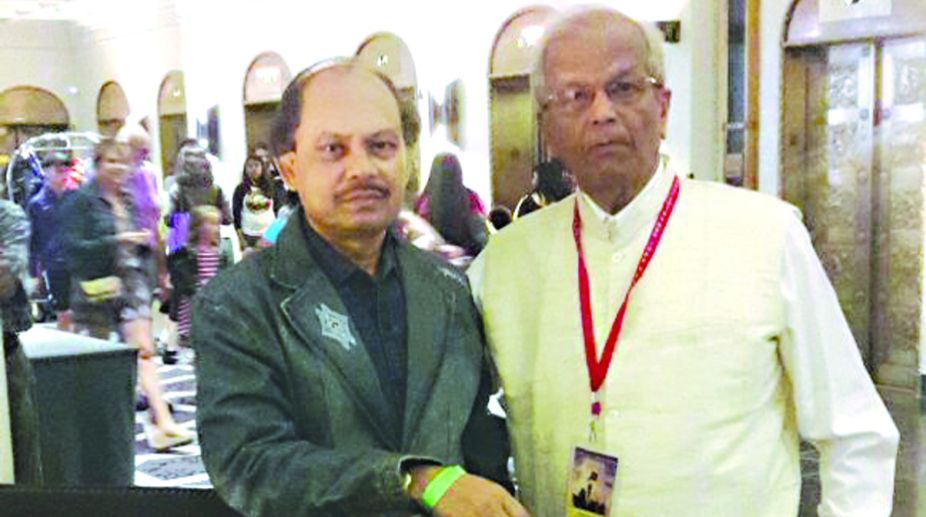Someone who developed a passion for exploring the mysteries of the moon through a telescope that his teacher, a Jesuit priest, had installed in an observatory at St Xavier’s College back in the 1950s soon discovered a universe of opportunities after he graduated with an engineering degree from Shibpur. From the humble roots in Chittagong from where the young Ajit Rakhit and his family travelled to the other Bengal after Partition, it has been a saga of discoveries from machine designing in Germany to handling sophisticated gears in F-18 fighter aircrafts in Southern California.
sWoven into all this is an unmistakable attachment to his cultural roots in Bengal during the six decades that has seen him taking a ship across the Suez to Geneva and then moving to Germany, Canada, England and the United States. In New Jersey where he currently lives, he set up an organisation called Kallol that was to be the rallying point for performing arts. Within a couple of years, it saw around 35,000 members drawn from the Bengali diaspora spending boisterous weekends and forming a brotherhood that has survived to this day.
Advertisement
None of this would have come to light had not a filmmaker with a record of meaningful work made him the subject of a documentary, Dreams Beyond Horizon. It was screened at the last Kolkata International Film Festival. Tapan Biswas’s interest in cinema was groomed in Kolkata during all the years that he
was associated with Tarun Majumdar as producer for around half a dozen of the veteran’s films as well as films by Rituparno Ghosh, Kaushik Ganguly and Anjan Dutt. Moving to Mumbai, he directed Morning Walk with Anupam Kher in the central role and has now become the gateway to markets in America where Rituparno’s Utsav and Titli had a major impact on the non-resident community that cherishes a sentimental bond with its cultural roots. The bond could grow stronger when the last Cinemawalla production, Just Another Love Story, with the late Rituparno playing the protagonist, is taken to different cities in America.
In the circumstances, it was perhaps natural that Tapan Biswas would discover an off-beat interest in the achievements of the man who has not only carried over extraordinary skills in machine design and gear technology but also sustains the warmth of countless encounters with the cultural fraternity from Kolkata. Ajit Rakhit turned out to be a success story that could be narrated with all the colourful details that the director could cram into a 50-minute documentary. The years at Hindu School, which thrived on the ripples of the Bengal Renaissance, were often desperate when money sent by his father, who was still in what was East Pakistan, arrived late.
But from there it was a giant leap to Langen, a small village in Germany with a population of barely 15,000, where he imbibed the spirit and craft from the “Mecca of Engineering” and then went on to do his doctorate in Birmingham. But the young man with a dream found that ambition had to be fulfilled with the grim struggle of balancing academics with the inescapable ritual of finding a livelihood through delivering mail from the British Post Office. It required all the courage and intelligence that the young man could muster to make the right moves.
Today it all reads like a story that is hard to believe. But, at 81, Dr Rakhit takes a mischievous delight in talking about the hardships even as he moved from Ford Motors in London to Montreal to complete the PhD, which he had left midway in England. If there was a message that the film had to deliver, it was that true grit and determination could take an aspiring engineer from the backwaters of Bengal to the cherished milieu of the American Society of Mechanical Engineers. He was elected a Fellow and soon joined the aerospace industry in Southern California after he finally moved with his family to the US in 1974. The film makes it clear that it was not just another Great American Dream that had prompted him to leave Indian shores. It was a career marked by well calibrated moves to experience the magic of machine design, gear technology and vibration analysis.
That is an experience that Rakhit shares with the industrial fraternity not only in America and Europe but also Japan and Korea. Four of his books on gear technology have become textbooks at universities where he enjoys sharing his experiences and ideas with students. Technical and financial factors may have prevented his books from reaching India. But what is hard to explain is the apathy that has kept him away from even his Alma Mater with which he still has an emotional bond. Looking back, he has fond recollections of his first mentor, Professor Amitabha Bhattacharya. But at a time when engineering colleges in Bengal are passing through difficult times, Dr Rakhit may well have become an inspiring symbol of self-determined success through lectures and informal interactions. Nothing would have made his annual visits to Kolkata more meaningful.
The film strikes more pleasing notes. Shot predominantly in Rakhit’s apartment in south Kolkata, it strays into the colourful adventure of staging plays organised by Kallol that drew an enthusiastic response in New Jersey and then heading Dakshini for cultural shows and organising the Durga Puja during his years in Los Angeles. It led to management of the North American Bengali Conference that had drawn Pandit Ravi Shankar to Los Angeles and has now become a permanent date on the cultural calendar in the US.
A steady stream of performers from Kolkata in the US had one warm destination that came alive with music and memories. All this is part of the excitement that he has passed on to a younger team. Retirement may have prompted him to sit back and perhaps write another book — this time targeting readers in India and, especially, the city he still loves. The documentary by Tapan Biswas may yet give a fresh and final turn to the story of a man who had discovered the power of a dream. Whether he writes a book, takes Tagore and Bengal’s rich cultural identity from coast to coast in the US or helps to explore new markets for Bengali films, it would be part of an inspiring legacy worth preserving.











